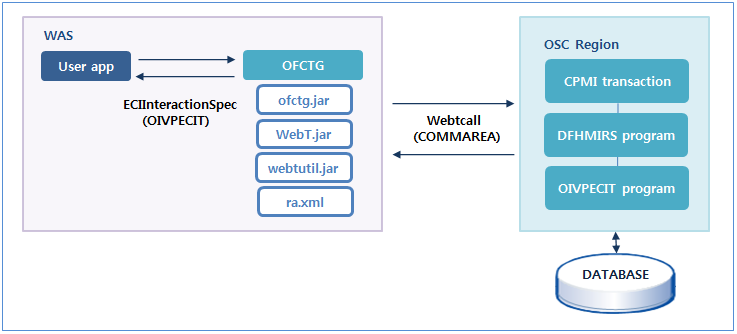Introduction
This chapter describes how to externally execute OpenFrame CICS Transaction Gateway (CTG), which is a program in the OSC application server.
1. Overview
With OpenFrame/OSC, you can externally execute applications managed in the OSC application server by using OpenFrame CTG.
OpenFrame CTG includes External Call Interface (ECI), which is an API used to call OpenFrame transactions. External applications that are not supported by OpenFrame can call COBOL or PL/I applications registered as a resource of OpenFrame/OSC Region by using ECI.
The following describes how OpenFrame CTG with JCA operates and also describes relevant configurations. OpenFrame CTG with JCA is a library package used as a resource adapter in the J2EE Connector Architecture (JCA) specification.
2. Operation
The following shows how to process data between applications and OSC Region by using OpenFrame CTG.

-
A Java application that runs on Web Application Server (WAS) sends a request of executing the OIVPECIT program in an OSC Region through ECI.
-
To use OpenFrame CTG, set the web application server provider’s information and the JCA information. For more information, refer to Resource Adapter Configuration.
-
The OSC Region executes the CPMI default transaction.
-
A DFHMIRS program corresponding to the transaction is executed.
-
The DFHMIRS program calls the OIVPECIT program by using LINK and sends COMMAREA.
-
The OIVPECIT program accesses a database and gets the necessary data.
-
After the data is saved in COMMAREA and a result value is returned, the COMMAREA data and the return value are sent to the client.
3. Resource Adapter Configuration
To use OpenFrame CTG, configure a resource adapter; set the web application server provider’s information and the JCA information.
To use com.tmax.ofctg.connector.cics package class, set the resource adapter name and type in the ra.xml file. Refer to the sample ra.xml in Resource Adapter Configuration File.
The following describes resource adapter properties.
| Name | Type | Value |
|---|---|---|
backup |
java.lang.String |
IP address of the OSC server’s backup host. |
backup_port |
java.lang.Integer |
Port number of the OSC server’s backup host. If support_xa is set to true, specify the JEUSGW port number set in the Tmax configuration file of OSC. |
connectionName |
java.lang.String |
Connection name, which is used internally such as for logging. |
connectionTimeout |
java.lang.Integer |
Maximum waiting time for a connection when accessing the OSC server. (Unit: seconds) |
encryption |
java.lang.Boolean |
Option to perform encryption. Can be used only for TmaxPort connections when support_xa is set to false. Not supported for communication with JEUSGW used for XA. |
headerType |
java.lang.String |
Protocol used for communication between OpenFrame CTG and the OSC server. Currently, only "extendedV4" is supported. |
host |
java.lang.String |
IP address of the OSC server’s host. |
host_port |
java.lang.Integer |
Port number of the OSC server’s host. If support_xa is set to true, specify the JEUSGW port number set in the Tmax configuration file of OSC. |
logBufSize |
java.lang.Integer |
Size of the buffer used for OpenFrame CTG to record logs. If the log size reaches the specified value, the log is recorded in a file. (Default value: 512 bytes) |
logDir |
java.lang.String |
Path of a log file created by OpenFrame CTG. |
logFile |
java.lang.String |
Name of a log file created by OpenFrame CTG. |
logFileFormat |
java.lang.String |
Date format preceded by the name of a log file created by OpenFrame CTG. (Default value: "MMddyyyy") |
logLevel |
java.lang.String |
Log level used when OpenFrame CTG records logs.
|
logValidDays |
java.lang.Integer |
1. |
regionName |
java.lang.String |
Name of the Region to connect. |
support_xa |
java.lang.Boolean |
Option to support XA. The value can be either true or false. |
tpTimeout |
java.lang.Integer |
Maximum waiting time for a response to a request. (Default value: 60 seconds) |
txHelperClassName |
java.lang.String |
Name of a transaction helper class that returns TransactionManager. If XA is supported, XAResource is enlisted in TransactionManager of the class with a name specified when calling getConnection(). Currently, the specified helper class calls getTransactionManager(). |
xidMapperFile |
java.lang.String |
Name of XidMapperFile used by OpenFrame CTG. XidMapperFile is used to record mapping and decision information about XID of WAS’s TransactionManager and XID used in OSC. |
xidMapperPath |
java.lang.String |
XidMapperFile path. |
4. Tmax Configuration for the OSC Server
To use global transactions by using JCA, configure the following in the Tmax configuration file of the OSC server.
*GATEWAY
JEUSGW GWTYPE = JEUS, PORTNO = 9000,
DIRECTION=IN,
NODENAME = NODE1,
CLOPT ="-r -h 4 -D 7 -o $(SVR)$(CDATE).out -e $(SVR)$(CDATE).err",
CPC = 2
| Item | Description |
|---|---|
GWTYPE |
JEUS. Set to JEUS even in Oracle WebLogic, IBM WebSphere, or other WAS environment. Specify Web Application Server (WAS) as a remote system. |
PORTNO |
Listen port number used by the gateway. |
DIRECTION |
Direction of requests between the gateway and WAS. If "IN" is specified, only received requests can be processed. |
NODENAME |
Name of a node where the gateway will be executed. Specify the name set in the NODE section of the Tmax configuration file. |
MAXINRGW |
Maximum number of channels to be accessed by the gateway. Can be set up to 128. (Default value: 32) |
CLOPT |
Options used by the gateway. CLOPT = "-r -h <n> -D <n> -o <filename> -e <filename>"
|
CPC |
Number of parallel communication channels between the gateway and CLH. Multiple channels for parallel communication improve processing performance. |
|
For more information about the Tmax configuration file, refer to "3.2. Basic Configuration" in Tmax Administrator’s Guide. |